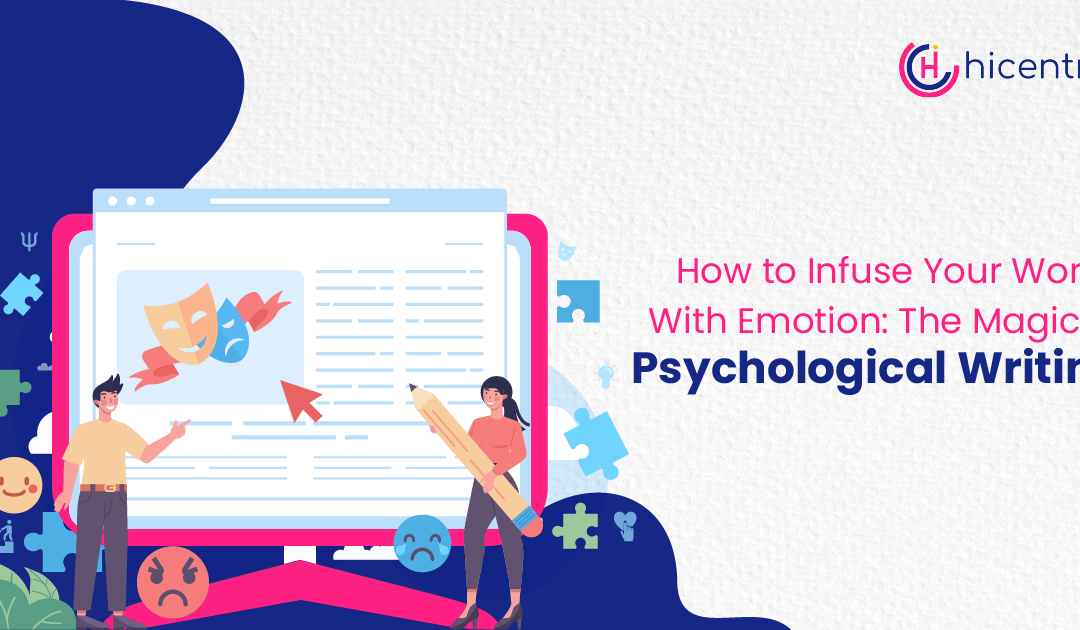When did the last time you paid attention to a piece of writing make you feel?
A self-help book gives you a sense of empowerment, inspiring you to face any problem that comes your way. Maybe a story about employee burnout struck you so deeply that you couldn’t help but exclaim at the end, “That’s exactly how I feel!” And remember the letter or email from a beloved buddy, full of inside jokes that made you smile.
The power of writing lies in the ability to evoke emotions. Words are just a combination of letters, but in the hands of wordsmiths, they become magic. A writer paints words into beautiful memories, opens new doors of knowledge, and even influences people to take action. Hence, there is a reason that people say, “A well-crafted word has the strength to change minds.”
An emotionally crafted article or blog builds a connection with a reader and leaves a lasting impression. A reader might not remember your words, but they will remember how it made them feel.
Knowing a link between writing and emotion is one thing and crafting and creating an impression is another. There is no” how to” guide, but wielding the emotions in writing includes a sum of technique, awareness, and empathy.
Write What You Feel
We all will agree that writers are readers too. At a basic level, certain words can trigger emotions. That’s where the clickbait titles matter. Emotions work. Clickbait titles, on the other hand, are the writing equal to cheap jump scares. Please don’t do it. Everyone despises them.
Instead, go a step further and generate profound resonance — the kind that makes people say things like, “I cried while reading this” or “I felt everything about this.” That necessitates nuance. And nuance requires two things: self-awareness and an extensive vocabulary.
Channel Your Emotions Well
People who think that emotions are the center of life frequently look for methods to “control” their emotions. Not at all. Only retaliate to them.
Simply put, emotions are messages telling us to pay attention to something. Then, we can determine whether or not that “something” is significant and identify the best way to deal with it.
The entire purpose of this is to be able to turn your emotions into what psychologists refer to as “goal-directed behavior.”
Motivate Yourself
Have you ever become wholly engaged in a task? Let’s say you might begin doing something and become wholly absorbed in it, and when you finally awaken from the quasi-hypnotic state, you discover that long hours have passed, yet it only seemed like fifteen.
This often happens to me. I lose my sense of time when I start writing. When I’m fleshing out concepts in my head and putting them into words, I get this flood of subtly nuanced sentiments.
I am flooded with such feelings. It motivates me to keep writing.
Most of us try to look for inspiration first so that we might make a significant decision and drastically alter both our situation and ourselves. They attempt to motivate themselves by engaging in whatever type of mental masturbation is fashionable that week so they can finally act. But by the following week, they’ve lost their desire and are back to their old tricks, switching to yet another “method” of inspiration.
The point here is that you have to do something to use your emotions effectively to carve them into words. Let’s say it directly: “Be your own motivation.”
Note: Remember that not always good feelings will motivate you. Sometimes, anger, frustration, and anxiety speak precisely how we want.
For example, sometimes, I feel anxious that my writing will not resonate with my readers. But for whatever reason, these feelings make me write more. Always challenge yourself with what is out of reach.
Dig Deep
If you’re unsure of how to express the desired emotion, search within. As a guide, consider your own feelings.
This complements the above point, but it goes further. Discover the source of your emotions rather than merely letting them inspire you. Use real-life experiences that have happened to you as inspiration.
Infuse your emotions with values.
In the 1990s, after the publication of Daniel Goleman’s book, “emotional intelligence” rose to prominence in psychology. To inspire their employees, CEOs, and managers attended retreats, read workbooks, and attended workshops on emotional intelligence. Therapists worked to increase their emotional awareness to help their patients take control of their life. To prepare their children for a world that is always changing and emotionally focused, parents were advised to help their children develop emotional intelligence.
A lot has been missing, however. And it will be right to say that emotional intelligence is meaningless without orienting your values.
We always choose what we value, whether we know it or not. And our emotions will carry out those principles in some way by inspiring our behavior.
Keep a Journal Around
Assume you need help with how to express yourself in writing. You have yet to gain experience putting things on paper. You should start journaling if you want to become used to it.
Journaling is the practice of writing down your thoughts, emotions, and feelings in a journal. It helps you understand how you’re feeling and minimizes stress and worry. It’s the ideal to organize your thoughts.
Writing down what makes you unhappy or puzzled will offer you practice with emotional writing. When a character faces adversity, you’ll know what they’re thinking. All that remains is for them to figure out how to deal with it.
Empathy
Although writing is rarely about the writer themselves, readers are the focus. Whether you’re trying to amuse, inform, or persuade them, you need to make an emotional connection with them through your words. No one will care about your narrative, no matter how good it is.
The subconscious nature of the interaction between writing and emotion makes it brilliant. Many people never stop to consider how various writing genres and styles influence their daily thoughts and emotions, and vice versa.
But those who look closely will realize that what appears to be a natural phenomenon was actually created by a sophisticated combination of science, art, and instinct.
Throughout history, powerful words have forged or broken reputations, founded or destroyed nations, and won or lost wars. Not much has changed since then. Writing is sometimes discussed in terms of “creating engagement” and “raising awareness,” but these are really modern labels for an old objective: to evoke emotion with words.
Epilogue
The art of incorporating depth and emotion into your writing is explored through psychological writing. Our blog offers helpful thoughts and strategies to help you engage your readers more deeply, whether you’re a seasoned writer or just getting started. You can establish a strong connection with your audience by comprehending the psychology of human emotions and using this information in your writing. This blog will assist you in improving your writing abilities and making your words resonate with readers. It covers everything from using evocative language to creating sympathetic characters and gripping plots. Discover the secrets of psychological writing to infuse your story with compelling emotion.
Nikita Sharma is Chief Strategy Centrik @ hicentrik. She Strategizes, Optimizes & Revises digital activities to deliver optimum results & returns.
6 Years of Global Experience in Multi-tasking, i.e. Digital Advertising, Social Media, Ad Campaigns, Web Design & Development, Lead Generation, and Reporting.




